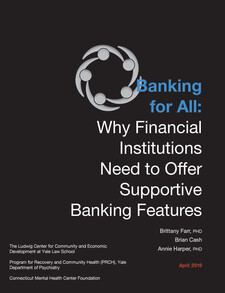Ludwig Center Report Advocates for Accessible Banking Features
On November 6, 2019, the Ludwig Center for Community and Economic Development4 at Yale Law School, together with the Program for Recovery and Community Health at the Yale Department of Psychiatry and the Connecticut Mental Health Center Foundation, Inc., presented a report, “Banking for All: Why Financial Institutions Need to Offer Supportive Banking Features,” to an audience of bankers, mental health advocates, consumer advocates, and legal aid attorneys. Brittany Farr ’19 and Brian Cash M. Arch. ’19, both alumni of the Community and Economic Development Clinic, and Annie Harper of the Yale School of Medicine coauthored the report.

The Banking for All report proposes three banking features that can make banking more accessible: customized alerts; self-imposed spending limits; and third-party view-only account access.
Presenting the report, Harper outlined the tools banks might offer to consumers to better serve vulnerable consumers, while Farr explained that these tools are consistent with existing federal and Connecticut banking and consumer protection statutes.
In his introductory remarks, Connecticut Banking Commissioner Jorge Perez explained that, “Providing banking services to everyone and in particular populations with special needs or that are vulnerable or that typically do not have access to the financial world is something that I take very seriously.” He added that he hopes “to make the system accessible to everyone.”
Over 43 million people in the United States experience a mental health issue annually. Mental health issues can make financial situations more complicated and financial stability more difficult to achieve. People with cognitive disabilities are much less likely to have a bank account than people without, according to the report.
Harper said that the features advocated in the report would all require consumer consent and opt-in and would begin to address the problem that “there really isn’t anything that allows people to engage in what’s called supported decision-making when it comes to finances.”
Supported decision-making maximizes self-sufficiency and self-determination for the consumer. Many people suffering from mental illness can manage their finances with some assistance and do not require a third party to control their money. But currently, there is no mechanism available for people who would benefit from such an option, according to the report. Instead, people whose mental illness makes it difficult for them to manage their own money must either informally share access to their finances with someone else, which carries all sorts of risks, or entirely relinquish control over their finances to a third-party conservator or guardian. These relationships are often onerous for both the conservators and mentally ill people. In the worst-case scenario, conservators may even exploit the people they are obligated to protect. Paul Hammer, a Recovery Support Specialist and Financial Coach, who has lived experience of struggling with his finances due to bipolar disorder, spoke of how difficult it was for him to find a conservator who could give him the support he needed.
After Harper described the proposed supportive banking features, Farr summarized the legal analysis in the report, which concludes: “These supportive banking features align with laws as well as policy proposals that relate to protection and accessibility.”
Kathy Flaherty, Executive Director of the Connecticut Legal Rights Project, a legal services and advocacy organization for people with disabilities, described the importance of understanding that people often have the solutions to improve their own lives when given the resources and opportunities.
“I think when you give people opportunities to maximize their self-determination, [they are] definitely better off, so I am just delighted to be here and part of this effort,” she said.
The supportive banking features advocated in Banking for All permit all people, including customers with mental illness, to choose an intermediate option. Banking for All argues that banks can better serve all customers by providing opt-in supportive banking features. As Harper argued, “When you do something with people with a particular disability in mind, you actually end up making the infrastructure we move in good for us all.” Farr agreed, “These features are good for everyone and would benefit lots of different populations, not just people with mental illness.”
The Ludwig Center for Community & Economic Development (CED) provides transactional legal services to clients seeking to promote economic opportunity and mobility. CED’s legal services help expand clients’ access to financial services, bring arts institutions and grocery stores to chronically under-resourced communities, break down barriers to affordable housing development in high-opportunity communities, promote access to healthy foods, and facilitate entrepreneurship among low-income people.


